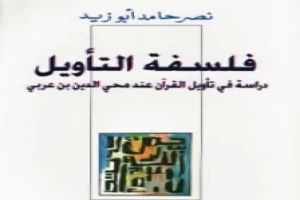Newly released
This book is new and will be uploaded as soon as it becomes available to us and if we secure the necessary publishing rights.

فلسفة التأويل Book PDF
(0)
Author:
Nasr Hamed Abu ZeidNumber Of Reads:
34
Language:
Arabic
Category:
Social sciencesSection:
Pages:
412
Quality:
good
Views:
929
Quate
Review
Save
Share
Book Description
Nasr Hamed Abu Zeid
Nasr Hamed Abu Zaid (July 10, 1943 - July 5, 2010) was an Egyptian academic, researcher specializing in Islamic studies and a specialist in Arabic philology and humanities. Nasr Abu Zeid was born in one of the villages of Tanta on July 10, 1943, and grew up in a simple rural family. At first, he did not obtain the General Secondary School Certificate to be able to complete his university studies, because his family was not able to support him at the university, so he was satisfied at first by obtaining Industrial Secondary School Diploma, Wireless Department, 1960 AD. Nasr obtained a BA from the Department of Arabic Language and Literature, Faculty of Arts, Cairo University, 1972, with an excellent grade, then a master’s degree from the same department and college in Islamic studies in 1976 and also with an excellent grade, then a doctorate from the same department and college in Islamic studies in 1979 with a grade of first honor. The writings of the Egyptian researcher caused a sensation in the media in the mid-nineties of the last century. Because of his scientific research, he was accused of apostasy and atheism. Due to the lack of legal means in Egypt to prosecute the charge of apostasy, the opponents of Nasr Hamid Abu Zayd worked to take advantage of the conditions of the Personal Status Court, in which the jurisprudence of Imam Abu Hanifa is applied, and in which they found a principle called “hesba” on the basis of which they demanded the court to differentiate between Abu Zaid and his wife . The court responded and ruled that Nasr Hamid Abu Zaid and his wife be forcibly separated, on the grounds that "a Muslim woman is not allowed to marry a non-Muslim." After that, the couple's life became in danger, and eventually Nasr Hamed Abu Zaid and his wife, Dr. Ibtihal Younes, a professor of French literature, moved from Cairo to exile to the Netherlands, to live there, where Nasr Hamid Abu Zeid worked as a professor of Islamic studies at Leiden University.
Book Currently Unavailable
This book is currently unavailable for publication. We obtained it under a Creative Commons license, but the author or publisher has not granted permission to publish it.
Rate Now
5 Stars
4 Stars
3 Stars
2 Stars
1 Stars
فلسفة التأويل Quotes
Top Rated
Latest
Quate
Be the first to leave a quote and earn 10 points
instead of 3
Comments
Be the first to leave a comment and earn 5 points
instead of 3